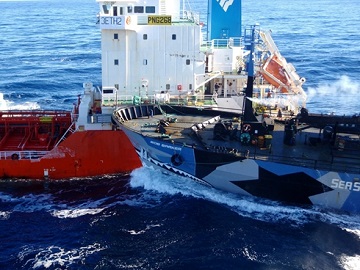Japan blames whaling foes for record-low catch
 Japanese whalers have returned from Antarctic waters with a record-low catch, and the government blamed what it called “unforgivable sabotage” by the activist group Sea Shepherd.
Japanese whalers have returned from Antarctic waters with a record-low catch, and the government blamed what it called “unforgivable sabotage” by the activist group Sea Shepherd.The annual 48-day hunt killed 103 minke whales, just 11% of the 935 the Japanese had hoped to take. The hunters also wanted 50 humpback and 50 fin whales but killed none, the Ministry of Agriculture, Forestry and Fisheries said. That’s the smallest catch since 1987, a year after “research whaling” was exempted under the international treaty that bans hunting the marine mammals.
Japanese ships spent 21 days trying to avoid four vessels from Sea Shepherd Australia, which disrupted the hunt four times, said Fisheries Minister Yoshimasa Hayashi, who called the group’s tactics sabotage. Sea Shepherd vessels collided with a factory ship and a fuel tanker to prevent refueling.
“We will seek more support from other countries to conduct research whaling in a stable manner,” he said.
Sea Shepherd Australia called the results “a financial disaster” and “economic lunacy,” citing the estimated $35 million cost of overhauling, outfitting, operating and fueling the Nisshin Maru factory ship.
“Sea Shepherd Australia is elated that we have delivered the worst season to date to these whale poachers from Japan. These poachers have shown a complete disregard for cetacean life, human life and Australian and International law,” Jeff Hansen said in a news release. “By targeting protected and endangered whales in a whale sanctuary and risking massive oil spills in the pristine Antarctic wilderness, they are showing the world their contempt for ocean life and for the global community who has consistently called for an end to whaling.”
The yearly hunt is conducted under the auspices of the Institute of Cetacean Research, the trade group for the Japanese whale-hunting industry. The group says that eating whale is a culinary tradition and that the “scientific” hunt is necessary to show that there are enough of the mammals to sustain commercial whaling. The slaughtered whales are then sold for food.
“The consumption of whale meat is a cultural tradition in a number of countries, including Japan,” an institute spokesman told TakePart. He added that the International Whaling Commission estimates that there are 515,000 minke whales in Antarctic waters.
“Modern whaling takes place on a sustainable basis and is carried out carefully to avoid impacts on overall whale stocks,” he said.
Critics say the issuance of “scientific permits” is just a loophole that allows a slaughter of whales for sushi and steaks in Japan and high-end restaurants elsewhere.
In February, a U.S. grand jury indicted a now-shuttered Los Angeles-area sushi restaurant and two chefs for allegedly selling endangered sei whales, which are protected under the Marine Mammal Protection Act.
The whaling group has regularly denounced Greenpeace and Sea Shepherd for their aggressive tactics, which it says are “akin to terrorism that threaten human life at sea.” The group asked U.S. courts to intervene.
At the end of February, the 9th U.S. Circuit Court of Appeals overturned a lower court and declared the Sea Shepherd Conservation Society to be modern-day pirates, ordering the U.S. activists to stop confronting Japanese ships in the Southern Ocean.
The ruling kept U.S. ships from joining their Australian counterparts and has dried up the group’s fundraising.
Hansen said that had the court’s “sucker punch” not kept the Americans away, the groups would have reduced this year’s kill even more.
Only Norway and Iceland openly defy an international moratorium on commercial whaling that’s been in place since 1986.
You can return to the main Market News page, or press the Back button on your browser.

